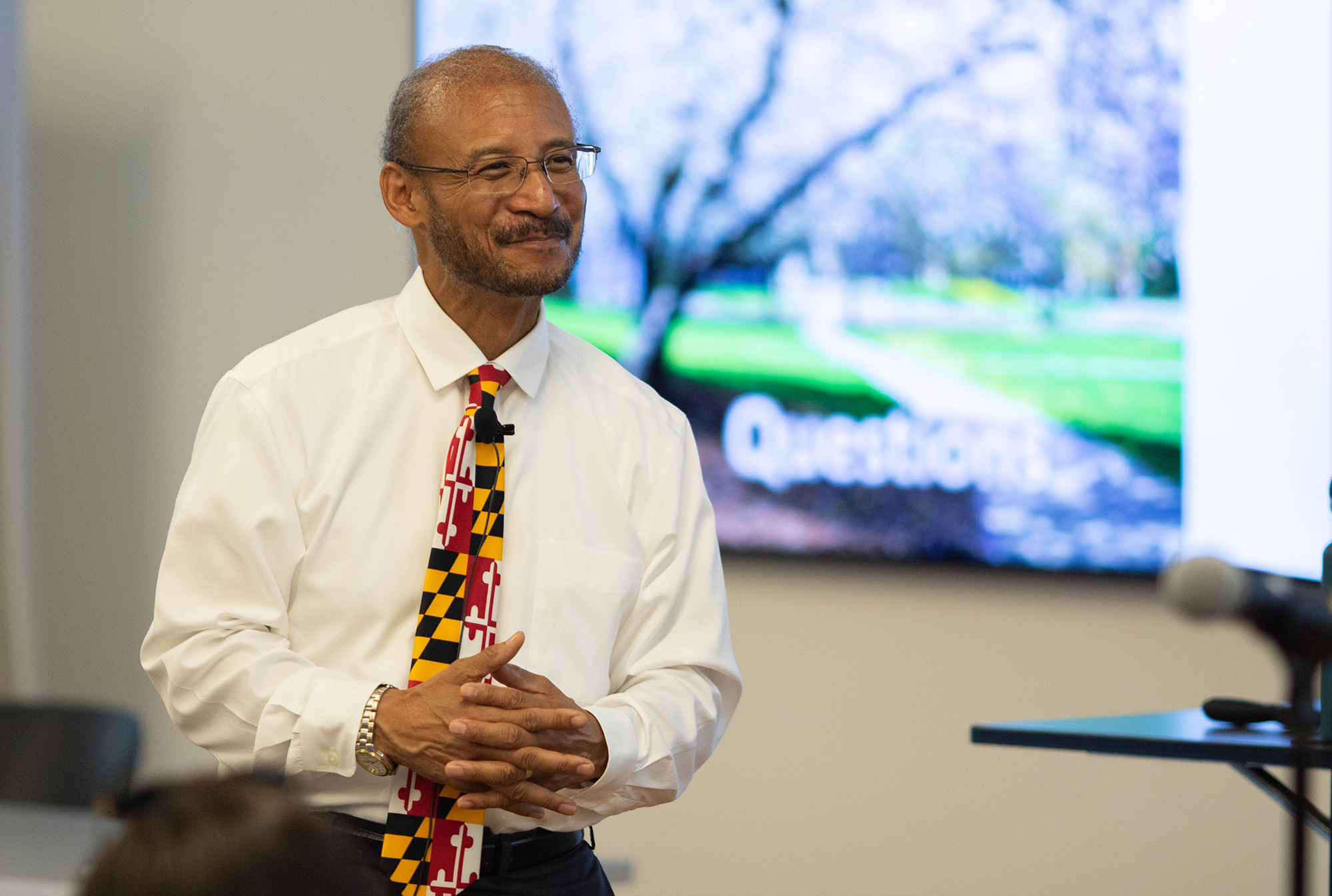When Warren Kelley was working as a counseling intern at Towson University, he learned first-hand how important it is for educators to see students as individuals.
“When you’re an administrator, you see the world kind of through the administrative lens,” he said. “You see the administrative process and policy. When you sit with students individually, you see a person.”
It’s an idea he’s latched onto in the years since and, he said, has contributed to his later work. He went on to hold several roles at the University of Maryland — including assistant student affairs vice president.
Now, Kelley is one of three finalists for the position of student affairs vice president. He made his case to about 25 students at a forum Wednesday, telling the room that, if given the job, he’d prioritize mental health, inclusivity and collaboration.
Kelley has been in his current role since 2001. He’s vying to fill a position left by Linda Clement, who started as student affairs vice president that same year and retired last month. The student affairs vice president oversees 1,800 staffers and a budget of more than $200 million, according to the university’s website.
[Read more: Potential UMD student affairs vice president talks honesty, intersectionality at forum]
Kelley received his bachelor’s, master’s and doctorate degrees from this university. Now, his children are students here. He said Wednesday that his connection to the community and professional experience as an administrator help him understand problems and necessary solutions, listing a series of university facilities and budget statistics.
“I’ve stayed here when choices have come up to do something different,” he said. “I really just love the community that we have here.”
Hannah Sanders and Nathan Grine, both first-year student affairs graduate students, attended the forum to gain a better understanding of the university and their field of study.
“The school’s clearly going through a lot of transitions,” Sanders said. “It’s interesting to see what process the school wants to go through to replace people, and what new ideas are being brought to the university.”
University President Wallace Loh is set to retire in June — turnover that comes on the heels of a chaotic three years. In May 2017, Richard Collins, a black Bowie State University student, was stabbed to death at a campus bus stop. Sean Urbanski, a white former student of this university, is set to stand trial for the crime in December.
In June 2018, Maryland football offensive lineman Jordan McNair died of heatstroke he suffered at a team workout. Just a few months later, freshman Olivia Paregol died of complications from adenovirus — an illness that had broken out on the campus that Paregol’s parents allege this university failed to communicate properly.
[Read more: A Year in Review: Remembering the 2018-19 school year at UMD]
Kelley said he’d prioritize collective healing and work to ensure minority students feel safe in the wake of turmoil.
“We were once known for diversity and inclusion in the country,” Kelley said. “I think we can be known again. I think we have all the ingredients here at Maryland to do this.”
Accompanied by a slideshow, Kelley laid out goals to improve facilities, finance, health and wellness, diversity and inclusion and leadership, while drawing upon his background within each area.
If chosen, Kelley, who has a doctorate in counseling psychology, said he hopes to build a “strong community of care” to better support students struggling with mental illness. He also said he hopes to create additional indoor and outdoor recreational spaces, but didn’t add specifics.
“It’s not just about the service of counseling or mental health, it’s about creating an ability and leveraging the community to spot people who are having difficulty and to help in ways that extend the care we provide,” Kelley said.
During a question and answer session, Kelley dove deep into mental illness, accessibility, disability accommodations and free speech on the campus.
Collaborating with students and finding methods for them to participate in decisions is high on Kelley’s agenda, he said, and building trust between students and administration is crucial in succeeding in his efforts.
While Sanders said she viewed some of Kelley’s answers as “fluffy” and lacking substance, she was impressed by the crux of his ideas.
“I think it’s challenging because I think from a student perspective we see administrators as having all the answers all the time — right when we want them — and that’s not always the case,” said Grine, agreeing with his peer. “These are not hard and fast decisions — these are decisions that need to be thought out.”
Kelley closed out his personal appeal to students by thanking Linda Clement for her support as a mentor — but stressing that he’d do the job differently.
“I am not Linda Clement,” Kelley said. “I’m a very different person. I’ve got a very different life experience and a different sense and a different vision. I’m ready to move forward and lead this division to enhance our morale, to keep what is best about us, to embrace change.”



